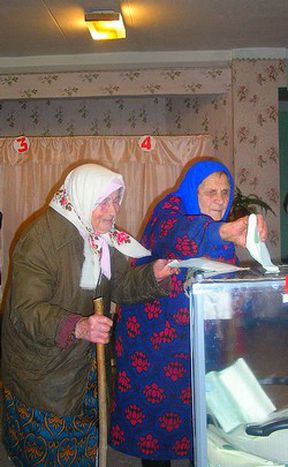
Ukraine crisis and a passive Europe
Published on
Translation by:
Nabeelah ShabbirThe fifth elections in three years, the latest by presidential fiat, take place on 30 September. Europe needs to sit up and pay more attention for the country to be an effective stabile democracy
After a long period of tug-and-war between president Victor Yushchenko and prime minister Victor Yanukovitch which began in May 2007, a solution lies in the form of parliamentary elections on 30 September. It's an opportunity for the country to channel a way out of the current one way street dilemma its been in since parliamentary elections in March 2006, where Yanukovitch's Party of Regions claimed victory with a narrow majority.
Pro-western Yushchenko wants to steer his country towards more European values, but without a political majority cannot put a coherent programme forward - for example, with his 'multivector' policy, an attempt to keep close relations with Russia and the EU. Of late in Kiev, the president, prime minister and parliament have been clashing over their differing degrees of responsibility, whilst the country slowly spirals into chaos. The problem? A young constitution with unclear individual competencies. Once these are defined with relation to the competences of parliament, prime minister and president, Ukraine can be more effective as a democratic state.
Wobbly EU steps
A stable democracy on the eastern border of Europe is also in the interests of the European Union. The Ukraine could act as an example for other former Soviet republics and serve as a stabilising element in the Black Sea region. Democracy from Kiev could also score points in Moscow in the longer term.
On the other hand, the EU also needs to be aware of the role it plays in the country's development. The 2003 European Neighbourhood Policy initiative laid the foundation for a closer partnership. Start-up phases of negotiation talks have been acknowledged with silence by the EU. With the same stroke entry conditions have hardened, signalling a clear rebuff for the Ukrainians. However in June 2007 the plan had its first modifications - shortened visa preparation time and reduced fees.
These attempts to inch closer have been received positively in Kiev. But the Ukrainians want clearer signs from the EU: not only financial injections for their economy, but more support for the democratic development process. Many Ukrainians ask themselves if democracy would be a good thing if it only complicates their lives in the process. Meanwhile the Kremlin in its corner of the ring jokes that the Ukrainians have voted for Europe, but it is an unrequited love.
Ukraine at Europe's gates
A concrete entry plan for the Ukraine was not evident in previous EU negotiations. Before any new countries can be accepted into the EU, they need to reach a new agreement and the other most recent member states should also be fully integrated. The Ukraine is still far from serious talks to join the European Union. But it is still a distinctive European country in its own right which at this moment in time is already rapping at the EU door.
At the moment it is more important to channel the neighbourhood policy into a new phase. The Ukraine has to take responsibility and come up with a concrete plan instead of drumming up support 'from above' via fast moving EU-advancement projects. These often miss the point and don't offer any long-term solution for the Ukraine.
Learning from mistakes
The EU have made the mistake of underestimating the value of effective collaboration once before. Instead of assuring Mikhail Gorbachev western support for his economic proposals at the G7 summit in 1991, they left the-then leader of the Soviet Union with empty pockets. Western diplomats including French and American presidents Mitterand and George Bush sr. wanted to bring the giant to its knees rather than ensure long-term financial support – a form of peace dividend – which would in the end have been less pricey than buying new weapons. Nationalism and xenophobia, social exclusion and corruption – democracy in Russia is on the countermarch. And the west is complicit in its passiveness.
Press freedom and attention to human rights in the Ukraine cannot be compared to that in Russia. But a clear European policy of bringing a close neighbour 'closer' can be a more dynamic step, and help avoid the Ukrainians turning even further away from the democratisation of their own country, especially in their current pre-election disillusion.
Translated from the Dutch by Alix Wurdak. Thanks to Pim de Kuijer
Homepage photo: Former female PM and candidate Yulia Tymoschenko, leader of the All-Ukrainian Union Fatherland party, has said she will 'sleep all day' on 29 September (the waving cat/ Flickr)
Translated from Krise in der Ukraine - Passivität in Europa



